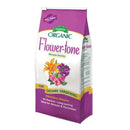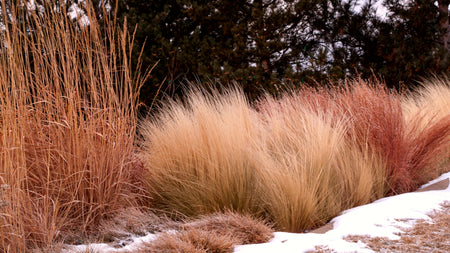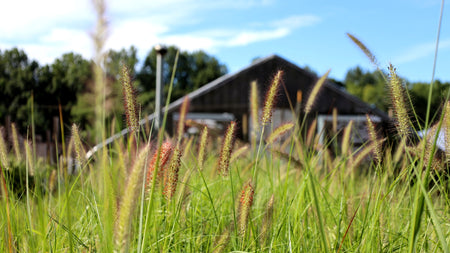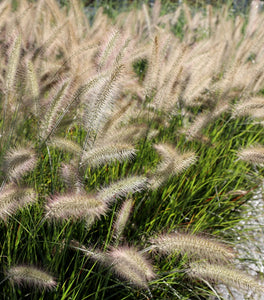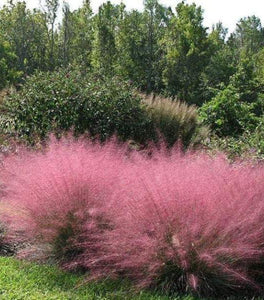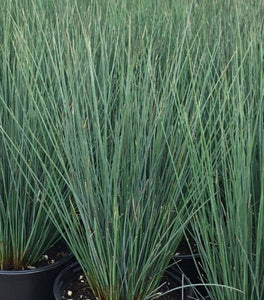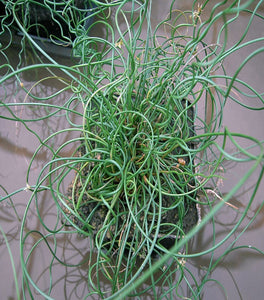
Images Depict Mature Plants
Juncus effusus for Sale Online
Juncus effusus, commonly known as Soft Rush, is a versatile and attractive ornamental grass that adds texture and movement to a wide range of garden settings. With its upright, slender green stems, this clump-forming grass grows in a tidy, vertical pattern, reaching a mature height of 2-4 feet and a spread of 1-2 feet. The fine, reed-like foliage makes Juncus effusus perfect for adding a natural, graceful element to rain gardens, wetland areas, and water features. Its sleek, minimalist form complements both modern and traditional garden designs, offering year-round interest with its semi-evergreen foliage.
Hardy in USDA Zones 4-9, Juncus effusus thrives in consistently moist to wet soils and can even tolerate standing water, making it an excellent choice for rain gardens, boggy areas, and pond edges. This ornamental grass prefers full sun to partial shade and can adapt to a variety of soil types, including poor or compacted soils. Its ability to handle wet conditions and stabilize soil makes it ideal for erosion control on slopes or in areas with poor drainage. Juncus effusus is not only low-maintenance but also deer-resistant, ensuring it remains a reliable feature in any garden without the need for frequent upkeep.
In addition to its ornamental appeal, Juncus effusus plays an important role in supporting local ecosystems. Its dense, clumping growth provides habitat for wildlife, while its ability to filter water in rain gardens helps improve water quality. Whether used to enhance naturalized landscapes, stabilize erosion-prone areas, or simply add texture and vertical interest, Juncus effusus offers both beauty and functionality, making it a valuable addition to any garden or water feature.
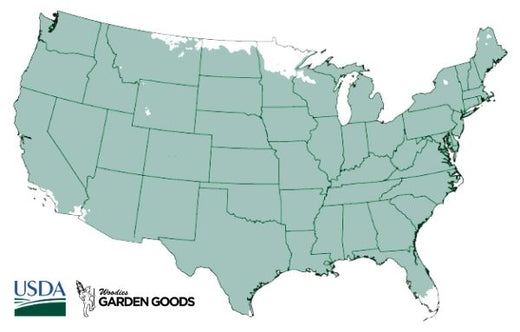
| Hardiness Zone: | 4-9 |
|---|---|
| Mature Height: | 2 to 4 feet |
| Mature Width: | 1 to 2 Feet |
| Sunlight: | Full Sun to Partial Sun |
| Water Requirements: | Moist to Wet |
| Selling Points: | Salt tolerant, Deer resistant, Wetland, Deer Resistant, Native |
How to Care for Juncus effusus
Before you buy Juncus effusus, make sure to read about the recommended care instructions to keep this plant healthy and thriving.
How Do I Plant Juncus Effusus?
To plant Juncus effusus (Soft Rush), start by selecting a location with full sun to partial shade and consistently moist to wet soil. This versatile ornamental grass thrives in damp environments, making it ideal for rain gardens, boggy areas, pond edges, and wetlands. Begin by digging a hole twice the width of the plant’s root ball and deep enough so the top of the root ball is level with the surrounding soil. Loosen the roots gently before placing the plant in the hole, then backfill with soil and press down firmly to eliminate air pockets. After planting, water thoroughly to help establish the roots in the new environment. When planting multiple Juncus effusus plants, space them 1 to 2 feet apart to allow for their mature width and upright growth habit. This plant can also be grown in containers as long as they have good drainage, though it prefers a consistently moist soil. Mulching around the base of the plant will help retain moisture and suppress weeds. Juncus effusus is low-maintenance once established, but it’s important to water regularly during the first growing season to promote healthy root development. With proper planting and care, Juncus effusus will thrive, adding vertical texture and visual interest to wet areas of your landscape.
How Do I Water Juncus Effusus?
To water Juncus effusus (Soft Rush), it’s important to maintain consistently moist to wet soil, as this plant thrives in damp environments. During the first growing season, water deeply and regularly to help the plant establish a strong root system. Be sure to water thoroughly, especially during dry spells, to ensure the soil remains saturated. This ornamental grass can tolerate standing water, making it an ideal choice for rain gardens, boggy areas, and along the edges of ponds or streams. If planted in containers, check the soil often and keep it consistently moist, as containers tend to dry out faster than garden beds. Once established, Juncus effusus is fairly low-maintenance, but it still performs best with regular access to water. While it can handle short periods of drought, prolonged dryness may cause the plant to become stressed, so it’s important to water frequently during hot or dry conditions. If the plant is located in a rain garden or near a water feature, natural rainfall or water flow may provide sufficient moisture, but supplemental watering during particularly dry seasons can help the plant maintain its vibrant green stems. Regular watering ensures that Juncus effusus continues to thrive, adding texture and visual interest to your garden or water landscape.
How Do I Fertilize Juncus Effusus?
To fertilize Juncus effusus (Soft Rush), apply a balanced, slow-release fertilizer in early spring to encourage healthy growth and maintain the plant’s vibrant green stems. A general-purpose 10-10-10 fertilizer works well, providing essential nutrients like nitrogen, phosphorus, and potassium. Spread the fertilizer evenly around the base of the plant, making sure to avoid direct contact with the foliage to prevent burning. After applying the fertilizer, water thoroughly to help the nutrients penetrate the soil and reach the roots. Organic options like compost or well-rotted manure are also effective for enriching the soil, especially in naturalized settings like rain gardens or wetland areas. Once Juncus effusus is established, it typically requires minimal additional fertilization, especially if planted in nutrient-rich soil. A light top-dressing of compost or a balanced fertilizer each spring should be sufficient to maintain its health. Over-fertilizing can result in overly vigorous growth, which may cause the plant to lose its characteristic upright form. For container-grown Juncus effusus, a liquid fertilizer applied every few months during the growing season will help sustain healthy growth. By following a balanced fertilization routine, you’ll ensure that your Juncus effusus remains lush and healthy, contributing structure and texture to rain gardens, water features, and other moist landscapes.

How Do I Prune Juncus Effusus?
To prune Juncus effusus (Soft Rush), the best time is in late winter or early spring, just before new growth begins. Use sharp pruning shears to cut back any dead, damaged, or discolored stems at the base of the plant. Removing old growth encourages fresh, healthy stems to emerge and keeps the plant looking neat and vibrant. Focus on trimming away any browned or dried-out stems that can detract from the plant's appearance. Pruning also improves air circulation around the plant, reducing the chance of fungal diseases and keeping the foliage looking its best throughout the growing season. During the growing season, Juncus effusus typically requires minimal pruning, as it maintains its upright, clumping form. However, if the plant becomes too dense or untidy, you can thin out some of the older stems to maintain its shape. For container-grown Juncus effusus, regular pruning can help manage the size of the plant and keep it looking attractive in smaller spaces. Avoid heavy pruning during the active growing season, as this may stress the plant. By pruning regularly, especially at the end of winter, you’ll ensure that your Juncus effusus remains a striking and tidy feature in your rain gardens, wetlands, or water features.








